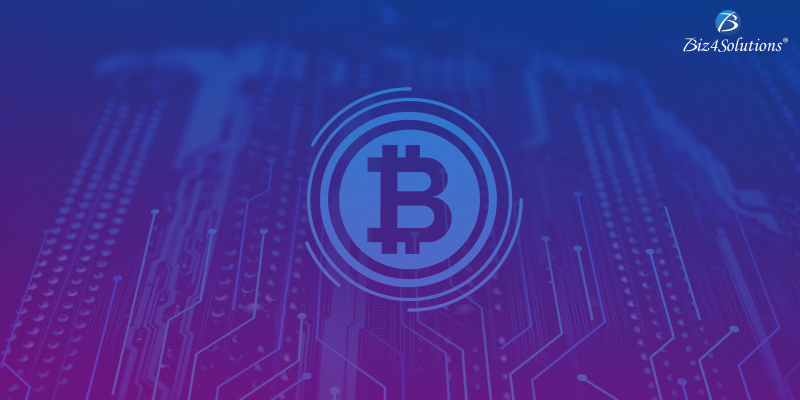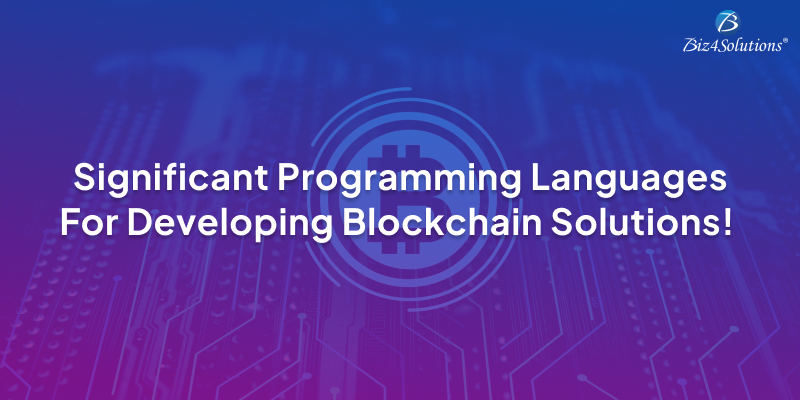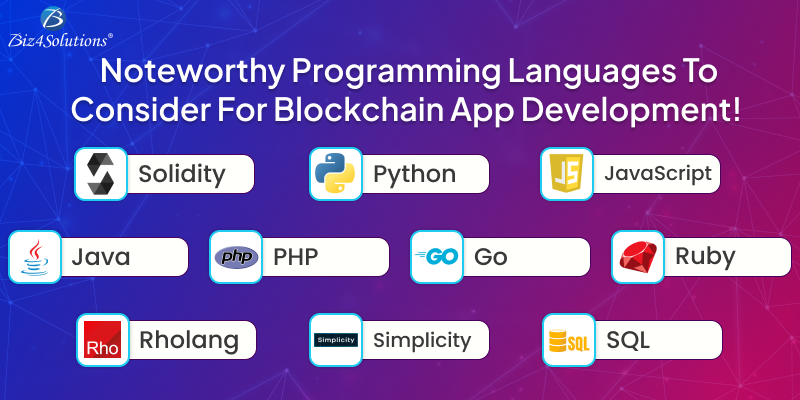Emergence of Blockchain-as-a-Service and its Potential Benefits!
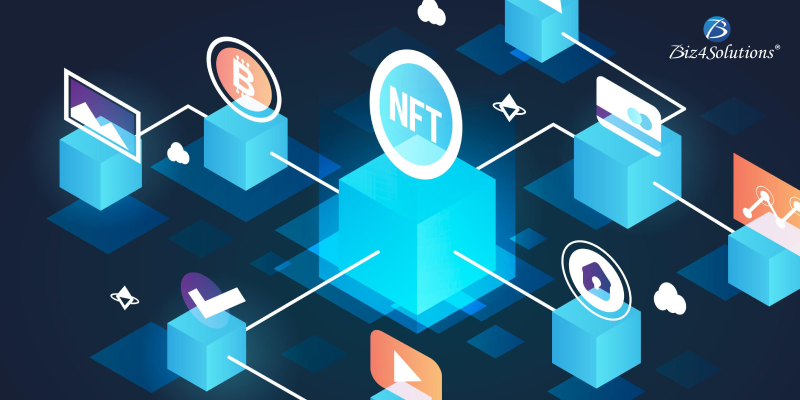
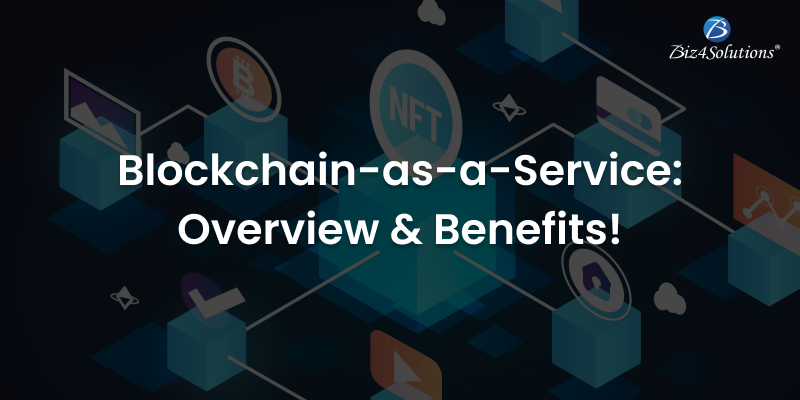
Did you know?
Global expenditure on Blockchain services is estimated to cross 15.9 billion by the year 2023, which was just 1.5 billion in 2018!- as per a report generated by Statista- a renowned online marketplace for statistics.
These staggering numbers portray a massive growth of this technology in just 5 years. Needless to say, Blockchain is going to be a game-changer. Introduced in 2011, Blockchain as a Service has already been the talk of the town and widely adopted by nearly 44% of organizations worldwide.
So, what is Blockchain technology? What is Blockchain-as-a-service? What are the potential advantages it offers to businesses? All such queries will be answered in this write-up.
What Is Blockchain Technology?
The term ‘Blockchain’ represents a digital ledger that enables writing data into ‘blocks.’ Every new block created is added to the previous one, thus creating a chain i.e. Blockchain. Every single block is secured through encryption while writing. In this system, users can access sensitive information using a unique key code. Besides, this peer-to-peer system does not need any third party for managing the transaction, making it a more secure system. Also, this digital ledger cannot be altered after the blocks are added to the chain, hence this system is very authentic.
Though explained in simple terms here, Blockchain is not that easy to implement. The operational overhead and technical complexities involved in developing, configuring, functioning, and maintaining Blockchains stand as a barrier. For instance, it’s difficult to estimate the transaction time in Blockchain solutions as the time may fluctuate from milliseconds to hours. As such, several businesses are struggling to leverage Blockchain solutions. Hence, you need experienced and competent Blockchain developers for correct development and implementation. Yet, it is one of the fastest-growing technologies today due to its key features like decentralized nature, encryption, top-level security, and trustworthiness while saving and processing sensitive data.
What Is Blockchain-As-A-Service (Or BaaS) All About?
Blockchain-as-a-Service i.e. BaaS has emerged as a third-party system for building and managing cloud-based networks for businesses to design powerful Blockchain-based applications for themselves. It enables them to create, host, and operate their own Blockchain applications and related functionalities.
This business model is considered to be a remarkable invention as Blockchain expands far beyond its most popular applications in cryptocurrency and can extensively be used for all kinds of transactions at minimal costs. It enables businesses to utilize Blockchain technology without the need for investing in an in-house team. BaaS acts like a kind of web host, running the back-end operation for Blockchain app development services. It also provides support activities like suitable allocation of resources, bandwidth management, data security features hosting requirements, etc. Thus, Blockchain Service Providers with the help of the BaaS model can access the Blockchain services from the cloud and develop the blockchain application at a minimum cost.
Today, the giants like Microsoft, Amazon, PayStand, and R3 are known to be the best BaaS providers across the globe.
Applications And Characteristics of Blockchain-as-a-Service!
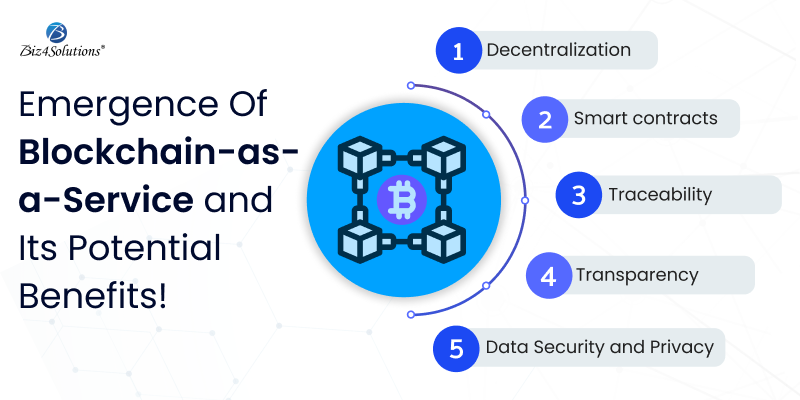
Decentralization
Here, decentralization means transferring control over data and related decisions from a centralized authority to a distributed network. Usually, most of the data is stored in local devices and computers and single entities monitor them. In case the employees are unavailable or those devices are shut down, accessing or restoring the data in real-time becomes tedious. In such cases, Blockchain is quite useful. It has a distributed ledger database where the data is stored in blocks. Here, data isn’t managed by any single node due to which other nodes too can access and control the data even if any single node isn’t working.
Smart Contracts
A smart contract is a contract where some particular conditions and situations are specified for the automatic execution of predefined tasks. These are programmed in such a manner that actions are taken automatically when the related terms of the agreements are performed. All this drastically reduces the requirement of intermediaries, enhances the speed of execution, makes the transactions cost-effective, and more reliable, and secure.
Smart contracts are employed in several applications like voting systems, supply chain management, healthcare data processing, payment and rent agreements, identity access, personal information access, intellectual property rights understanding, royalty distribution agreement, etc.
Traceability
All the data is stored and can be accessed publicly in a Blockchain system, allowing everyone to view it and make modifications to it for ensuring no false data is used. But, the whole process is governed by Blockchain consensus algorithms. Due to this, without the permission of all other participants, no one can make any alterations. Also, nodes are used for recording every single action taken. Thus, traceability is ensured resulting in effective communication and improved business relationships.
Transparency
Along with traceability, Blockchain app development also ensures transparency in the business processes. Since Blockchain is unchangeable in nature, the data in the blocks can’t be added, modified, or eliminated anonymously. Also, it is possible to track everything in real-time due to the distributed ledger technology. All this ensures accountability, gains the trust of the clients, and thus, improves business relationships.
Data Security and Privacy
As explained earlier, all the data and content are open, accessible publicly, and encrypted. However, only the users that are approved by the node manager can access the content and modify it. This property of Blockchain leads to high security and privacy of data from those outside the complete system.
Cases of data breaches and hacking crimes are on the rise and Blockchain’s security feature can tackle this problem completely. It applies several cryptographic techniques, hash keys, Merkle trees, etc. making it highly difficult to revise or steal the data. Besides, projects like Eximchain and Signal have been developed to ensure seamless and secure business communication and transactions.
Pros And Cons of BaaS
Take a look at the pros and cons of Blockchain as a Service
Pros:
- Ease of use due to the availability of ready-made customizable templates and modules.
- Outsourcing tasks like operations, implementation, and maintenance to the BaaS partner greatly helps in reducing operational costs to a large extent.
- Focused on customization
- High security and protection from fraudulent transactions
- Owing to the customizable modules and templates that BaaS provides, there is an ease of use in developing Blockchain systems.
Cons:
- Possibility of service disruption. Issues in business continuity in case the service provider goes bankrupt
- Low control and visibility of the owners due to dependency on BaaS service providers
- Challenges in data compliance
- Still in infancy. Businesses do not have in-depth knowledge of how it works. Also, finding adept Blockchain app developers is quite difficult.
Are You Interested in Building a Top-Class Website or Mobile App?
Wrap-Up:
The world is witnessing the emergence of various Blockchain-based services at a fast pace. Blockchain app development and BaaS solution for business are impacting numerous industries like Information Technology, Insurance, Healthcare, eCommerce, Entertainment industry, Advertising, Retail, Finance Industry, Cloud Computing, Energy, Government Projects, etc. with a wide range of applications.
These are promising offerings that can revolutionize business functions and help organizations gain a competitive advantage. Adoption of Blockchain app development services can provide businesses of all categories an opportunity to emerge as a leader and a pioneer amongst their peers. The organizations leveraging this technology are sure to bring a paradigm shift in the way they deal with data and perform several business transactions.

